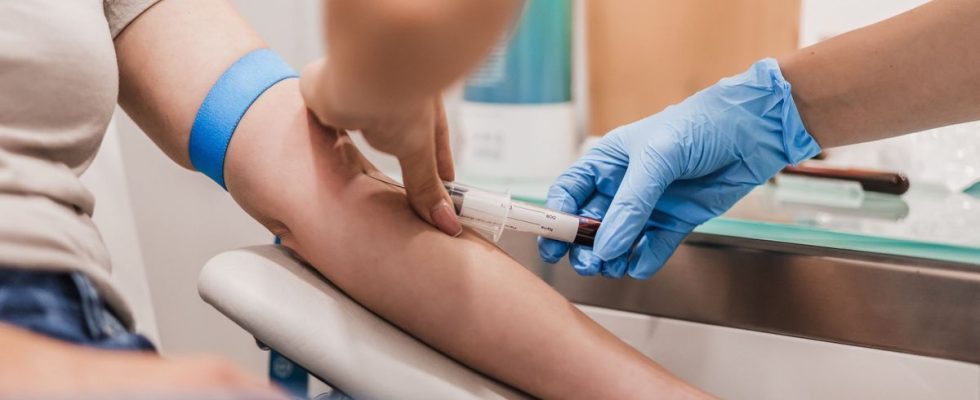Published on
Updated
Reading 3 min.
Diagnosing Alzheimer’s disease using a simple blood test: this revolution, pursued for years by research, is about to become reality. But for patients, the benefit will only be tangible if effective treatments are finally available.
“Blood biomarkers will change the way we diagnose“, summarizes neurologist Giovanni Frisoni, one of the leading European specialists in Alzheimer’s disease, to AFP.
For years, it has been one of the main focuses of research into this disease, the most common form of dementia, which irreversibly affects tens of millions of people around the world.
The idea is to be able, through a simple blood test, to identify signs revealing the physiological mechanisms by which the disease sets in.
We know two main mechanisms, without fully understanding their interaction: the formation in the brain of so-called amyloid protein plaques, which compress neurons and ultimately destroy them. And the accumulation of other proteins, called Tau, within the neurons themselves.
Examinations already exist: via a lumbar puncture or via a medical imaging technique, positron emission tomography (PET). But as they are long, heavy and expensive, many patients are stuck with clinical findings, such as severe memory loss.
Some blood tests are already marketed but, in fact, little used pending data on their real benefit. However, in recent months, several studies have demonstrated the effectiveness of certain blood tests in identifying internal signs of the disease.
The most notable dates back to January, in the magazine Jama Neurology. Carried out by following some 800 people, it concludes that a blood test makes it possible to identify an abnormal quantity of amyloid or Tau with an effectiveness comparable to the examinations currently in force.
Crucially, this test proves useful at a “preclinical” stage, even before the appearance of characteristic symptoms of the disease.
The medical world has generally welcomed an important advance, despite limitations. This effectiveness will have to be confirmed in real practice and, above all, such a test only points to the presence of physiological mechanisms which do not systematically result in dementia.
A diagnosis, not a screening
It stays “an excellent study which puts us on the verge of being able to use a blood test for Alzheimer’s disease on a daily basis“, judged neurologist Bart de Strooper in a reaction to the British Science Media Center (SMC).
In the UK, this is already almost a reality. A program, initiated by several anti-Alzheimer’s organizations, has aimed since last year to test the benefit of these blood tests within the British healthcare system.
What for ? Without effective treatment, early diagnosis is of little benefit. However, many neurologists are currently hoping that drugs can work.
After decades of unsuccessful research, two treatments – one by the Eli Lilly laboratory, the other by Biogen – appear to be able to slow the progression of Alzheimer’s by attacking amyloid plaques.
Their effectiveness is modest and the side effects are serious, but for many neurologists, it is a first step towards other, more effective treatments.
In this context, it appears promising to be able, using a simple blood test, to identify Alzheimer’s disease as quickly as possible in order to increase the effect of a treatment.
There remains one significant nuance. We are talking here about an early diagnosis, in patients with already poor memory, and certainly not a screening that would be aimed at just anyone.
“Today, there would be no point in testing blood biomarkers in people who do not have a cognitive deficit: it would only do harm.“, underlines Mr. Frisoni.
What should we do, in fact, with the announcement that we have a higher risk of developing the disease, without any concrete means to prevent its appearance? Mr. Frisoni, however, does not rule out one day seeing Alzheimer’s screening become a reality.
“We are currently testing certain drugs that aim to reduce the risk of Alzheimer’s dementia.“, he explains. “Maybe, in five or ten years, it will be in clinical practice. At this point, I will be able to say +Yes, I recommend measuring blood biomarkers (as a screening tool)+. But today, no“.
